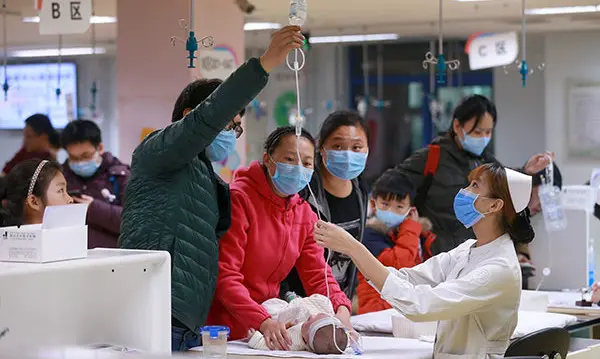"There are so many people and so few doctors," said Chen Yang as he sat in a waiting room at Beijing Children's Hospital late last month.
He had rushed his 6-month-old nephew to hospital early in the afternoon after noticing the child had suddenly developed a severe cough, and at 10 pm, he was still waiting for the result of a chest X-ray.
"There were hundreds of people ahead of us waiting to see a doctor when we arrived," he said. "There were long lines everywhere, and the information desk was crowded with patients."
His nephew was eventually diagnosed with pneumonia and prescribed a series of saline drips, which meant returning to play the same waiting game for the next three days.
Chen's experience is a common one, not just at Beijing Children's Hospital, one of the best in the capital, but at similar clinics nationwide.
China is short of nearly 90,000 pediatricians, according to a white paper released in November by the Chinese Medical Doctor Association, which has warned that the universal two-child policy could pile on even more pressure.
With just one pediatrician per 1,800 children, the nation currently lags behind many developed countries, according to the report, which is based on a survey of 13,000 medical institutions nationwide. Earlier last year, the central government set a target of making it one pediatrician per 1,450 children by 2020.
Children await treatment at Beijing Children's Hospital in December. Photo: China Daily
To accomplish that, authorities will need to reverse a trend that has seen 14,310, or more than 10 percent of pediatricians in China, leave for other professions between 2011 and 2014, according to research by the association.
Yang Qiuli, a doctor at a children's hospital in Xuzhou, Jiangsu province, said the chief complaints are the low salaries on offer, the heavy workload and the growing risk of conflicts with patients.
Severe pollution, which has affected regions across the north in recent months, has also further compounded the problem, according to health professionals.
Chen's nephew was among many children taken to Beijing Children's Hospital on Dec 18 for treatment after developing coughs during the capital's smog "red alert".
A woman in the emergency department, with her 3-month-old son who was experiencing respiratory difficulties, said she had been waiting for five hours, and had been told there was a shortage of available beds and only two doctors.
"Pediatrics wards are like a barometer of the weather," said Zhang Jiao, a pediatrician at Beijing United Family Hospital, who confirmed that the heavy smog had resulted in an increase of infant patients.
"Children are most sensitive to the weather, and conditions such as fevers and coughs are common on days with poor air quality."
Zhang worked from 7 pm until 7 am on Dec 18 and 19, and within the first three hours, she had received more than 10 patients, she said, adding that the hospital had placed an extra doctor on duty, bringing the total number up to three.
"Pediatricians are in great shortage," Zhang said. "In many big hospitals, pediatricians have to struggle to keep up with the excessive number of patients."
First Person
Yang Qiuli is a pediatrician at Xuzhou Children's Hospital in Jiangsu province. Photo: China Daily
Work pressure, low pay add to talent drain
I started as a pediatrician in 2001, and was recently transferred to a management role. In my experience, a pediatrician's job is more difficult than that of other doctors, and the talent drain of pediatricians is more serious, resulting in a shortage.
The work of pediatricians is more challenging because, unlike adults, children, especially babies, cannot clearly express their condition, which poses difficulties for pediatricians in diagnosis and treatment.
On the other hand, children attract more attention from society and pediatricians may face higher risks if accidents happen during treatment.
Another reason for the loss is tense doctor-patient relations, which has put a lot of pressure on pediatricians. Many parents want to see their children recover quickly or get better immediately after treatment, but there are certain conditions that medical treatment cannot cure.
Despite more challenging work, pediatricians, in general, earn less than doctors treating adult diseases. This is also a major reason why many young pediatricians choose to quit.
A few days ago one of my colleagues resigned because she could not stand the heavy workload.
On average, Xuzhou Children's Hospital receives 3,000 patients every day, and pediatricians generally work with a full load. It is not uncommon for pediatricians to work for 24 hours straight to cope with the demand from the large number of patients. A pediatrician can receive more than 80 patients per day during peak seasons.
Heavy workload, less pay and higher risks-all these have contributed to the loss of pediatricians. And, in turn, the shortage of pediatricians results in a heavier workload. This creates a bad cycle.
We hope to see a better relationship between doctors and patients, so patients can have more trust in doctors. We also hope the government can make more favorable policies to increase the appeal of being a pediatrician.
I believe pediatricians will have a better working environment with the current medical reform, so it will benefit everyone.
(CHINA DAILY)
 简体中文
简体中文





